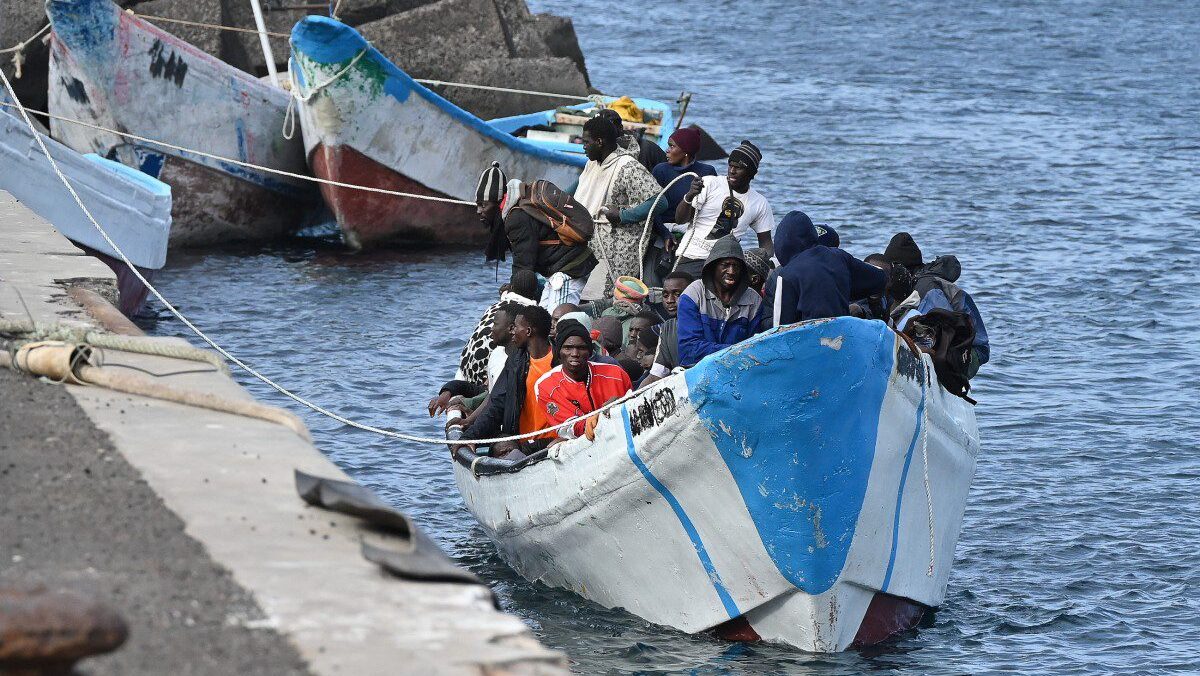
Migrants sit in a boat at La Restinga port, in the municipality of El Pinar on the Canary Island of El Hierro, on February 4, 2023.
Photo: STRINGER / AFP
A qualified majority of EU ambassadors have approved a provisional deal reached in December between the European Council presidency and the European Parliament on the EU’s Migration and Asylum Pact. The deal, fine-tuned and adopted on Thursday, February 8th, is strongly opposed by Central European countries, as it essentially attempts to ‘manage— not stop—migration, forcing member states to accept unwanted migrants or pay a fine.
“We Slovaks, Hungarians, and Poles, voted against legislative acts that speak of so-called solidarity. Unfortunately, we were overruled by several member states,” Slovak Interior Minister Matúš Šutaj Eštok said of the deal that includes a ‘mandatory solidarity mechanism’—forcing countries to choose between accepting migrants or paying hefty sums into a common fund.
According to the pact, 30,000 asylum-seekers would be distributed annually throughout the whole bloc, and member states would have to pay a compensation of €20,000 per every migrant they reject. In Slovakia’s case, this would mean 285 migrants, or €5.7 million per year.
In a crisis situation, member states would be requested to take in an additional number of migrants, but without the option of paying a fine instead of receiving the migrants. Criticising the deal, György Bakondi, the Hungarian prime minister’s chief domestic security advisor told Hungarian media:
This is a serious violation of our sovereignty: choosing whom we wanted to accept would be decided neither by Hungarian authorities, nor by Hungarian law, but by EU headquarters.
Both Slovakia and Hungary criticised the fact that, in a crisis situation, some asylum procedures would be moved away from frontline countries in order to ease their burden, forcing other states to accommodate migrants and examine their asylum claims. “Asylum procedures will be moved to Slovakia, which will mean de facto that the migrants concerned will never leave Slovakia again,” Matúš Šutaj Eštok complained.
Poland also opposes the pact, saying it “does not strike an appropriate balance between responsibility and solidarity and may therefore potentially constitute an area of dispute between the EU institutions and member states in the future.” Prime Minister Donald Tusk declared that his government would refuse to accept any relocated asylum seekers under the pact, although it may be willing to pay the amounts set by the European Commission, according to an opposition MP.
The Czech ambassador abstained in Thursday’s vote, despite the government welcoming the agreement reached in December. The change of heart could be because the Czech opposition, led by former Prime Minister Andrej Babiš, criticised the pact, describing it as an “invitation to millions of migrants to Europe,” and urged Prague to follow in the footsteps of Budapest and Warsaw. The centre-right-liberal government may be hardening its stance in view of this year’s European elections where migration will be a hot topic.
The new rules contain an attempt to conduct more effective checks on migrants, as well as a goal of more rapidly returning unapproved asylum seekers to their countries of origin. People whose asylum applications are unlikely to be approved would be prevented from entering the bloc and held in detention centres at the border, as would people seen as a threat to security. As the pact envisages asylum applications to be assessed within a maximum of six months, migrants could remain in detention centres for that duration of time—something human rights groups are unhappy about.
In order for the pact to be finally adopted, the measures must be approved by the European Parliament and by the European Council (member states). The approval in the Council will be done by a qualified majority vote, meaning individual countries will not be able to veto.
